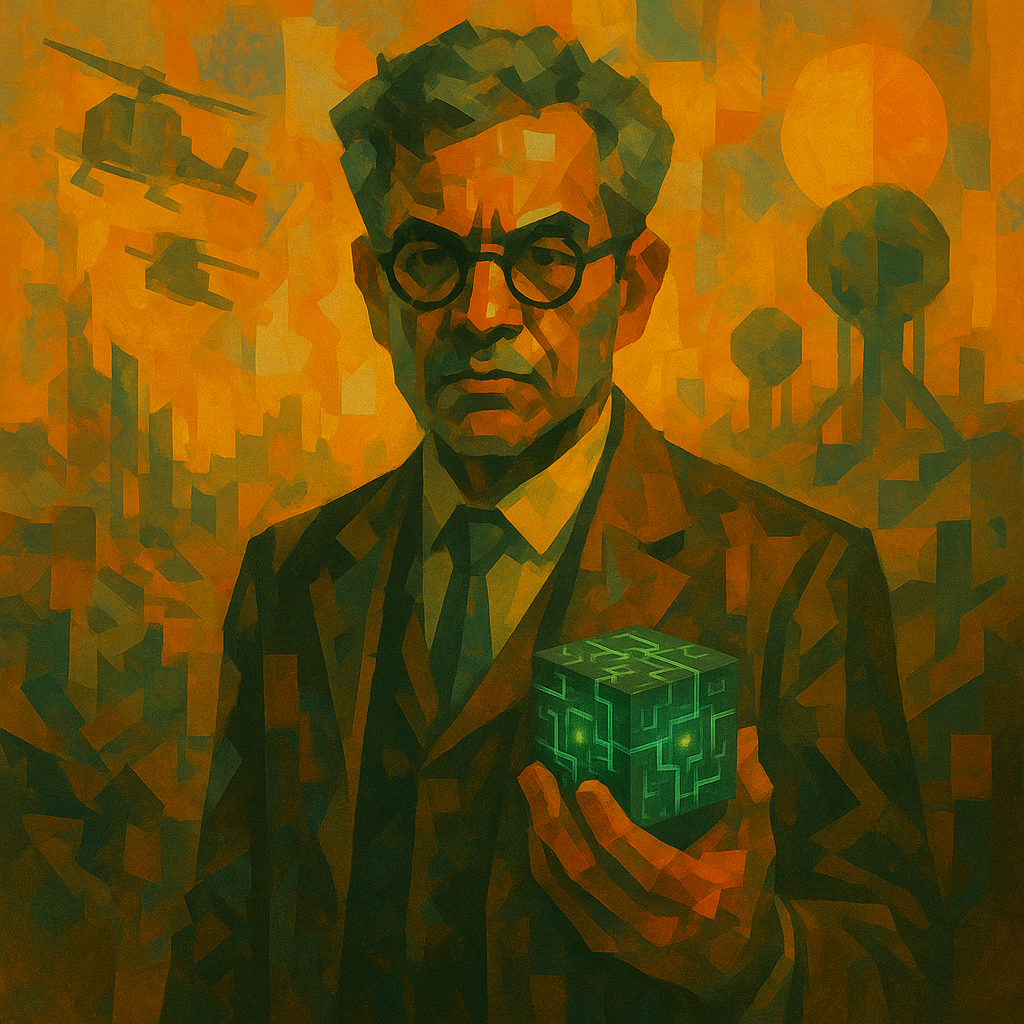Oubliette – A Mind Prison

Back in 2014, I signed up for a series of writing workshops that focused on creative prompts and collaborative exploration. These were called prompt writing workshops—each session began with a handful of imaginative prompts, followed by a short window of time to craft a story inspired by them. It was spontaneous, challenging, and—most of all—fun.
Recently, while browsing through an old bookshelf, I stumbled upon the notebook where I had scribbled down those early pieces. Leafing through its pages brought back a rush of memories—and I realized how many of those short bursts of imagination were actually the seeds of longer stories still evolving in my mind. The original 2014 story is also linked at the end of this post.
Many of these early writings might feel unfinished, and that’s because they are. They’re fragments—glimpses into larger worlds waiting to be told. This story was sparked by the prompts given in a 10-week writing workshop.
Years later, I’ve returned to one of those stories. I’ve reimagined and expanded it, staying true to its roots while giving it new depth.
The Setting
The apocalypse had not yet arrived—but by the late 2040s, humanity was undoubtedly on the path toward it.
The collapse of major democratic institutions across the globe triggered a chain reaction. What began as isolated uprisings—idealistic, almost innocent—soon evolved into coordinated revolutions of overwhelming scale. The few remaining republics, scattered and overstretched, found themselves under siege. Most fell swiftly. The last bastions of democracy—confined largely to the North American continent and a beleaguered Europa—faced extinction.
Of the two, Europa held out longer. Its geography granted it a fragile advantage. The towering Hindu Kush mountains formed a natural barrier in the east, impossible to cross without advanced fuel logistics—something the revolutionaries lacked after three punishing mountain wars. To the south, the Sahara had transformed into the most inhospitable desert on Earth, its temperatures and storms exceeding anything previously recorded. With the cold and desolate Hindu Kush to the east, the scorched Sahara to the south, and the Atlantic’s vast waters encircling the rest, Europa earned itself a few more years of uneasy survival.
Amid the encroaching chaos, a handful of visionaries still clung to the belief that the course of history could be changed by a single human mind. They fought—not just with weapons, but with ideas. And between battles, they turned their eyes skyward, still dreaming of peace among the stars.

Among them was Pierre Mogambo—child prodigy, theoretical physicist, neuroscientist, and later, the recipient of the 2078 Nobel Prize. To most, he was simply “Mogambo.”
In 2047, at the age of twenty-one, Mogambo joined CERN. His groundbreaking research in quantum physics shook the scientific establishment. Within just a few years, his work had revolutionized computing—enabling the creation of palm-sized quantum processors, capable of immense computational power. These devices could self-sustain on ambient heat, light, or, if necessary, small battery units. More astonishing still, Mogambo’s collaboration with top neuroscientists led to the first true artificial brain—an intelligence not only computationally powerful, but capable of mirroring the complexity, adaptability, and nuance of the human mind.
At the same time, the world’s resources were vanishing at an unsustainable rate. Scarcity intensified conflict. Extremist factions—particularly those aligned with jihadist revolutionary ideologies—began casting their gaze toward the last remaining republics.
Desperate to understand the accelerating collapse of global consciousness, psychologists turned to Mogambo’s artificial brain. Could this construct, modeled so precisely on the human mind, reveal why humanity had abandoned preservation in favor of self-destruction?
What they discovered was both enlightening and disturbing.
The brain’s emulation revealed how human neurology could be rewired at scale—how collective behavior could be shaped, even manipulated. As Mogambo and his team mapped neural pathways and studied their formation, they began to uncover methods not just for guiding behavior, but for preventing the formation of specific thoughts.
This revelation led to Mogambo’s most controversial and celebrated invention: NeuroLock Protocol.
A secure mental barrier or “lockdown” of thought pathways — a mind prison; not of stone or steel, but engineered restructuring of cognition—where thoughts are reforged or suppressed.
It was a system designed to isolate and neutralize thoughts deemed dangerous. A neural trap. A quiet, elegant weapon. One that could stop a revolution, not with bullets, but by erasing the very possibility of rebellion from consciousness.
The world had not yet ended. But with Oubliette, it had found a new way to control itself.
Oubliette – A Mind Prison
~~~ 1 ~~~
The world had become uniform.
It hummed with peace—engineered, structured, perfected peace. The kind that came not from harmony but from homogeny. Citizens moved about their days in quiet synchrony, dressed alike, thinking alike, their choices narrowed to the edge of nonexistence. Even here, in one of the city’s most picturesque parks—trees curated for seasonal bloom, flowers preselected for emotional neutrality, air perfumed with artificial spring—everything exuded calm, order, and contentment.
And yet, Charles de Lint felt caged.
He was, by all definitions remaining, a free soul. A stubborn flicker of contrast in a grayscale society. On this morning—as on every morning—he wore one of his beloved vintage tweed three-piece suits, this one a rich burnt sienna with soft olive plaid. The texture comforted him. The color thrilled him. And more than anything, it set him apart.
In his modest apartment, Charles kept an entire wardrobe of such relics—clothing from another time, another way of being. He cherished them not just for their aesthetic but for what they represented: the messy, chaotic beauty of choice. The whisper of defiance in a world that no longer encouraged standing out.
Where are the colors? he thought, eyes drifting across the rows of perfectly trimmed bushes. Why did we let them fade?
And just like that, the thought slipped away—vanished, like a dream upon waking. Charles blinked, unsettled but unsurprised. This happened often.
The world had made peace with itself in the year 2084, or so the records claimed. Charles didn’t remember much of it. Whether due to age, illness, or something else, his memories before the transition were fragmented, watermarked by emotion but blurred of detail. In the rare nights when he could sleep, dreams would come—brief, bright, incomprehensible—and just as quickly vanish, leaving behind a phantom ache. A sense of something lost.
He closed his eyes. The sun was warm, the grass impossibly green, and somewhere in the distance, synthetic birdsong played on loop. He might have dozed off—if not for the voice that broke the air.
“Charlie boy, nice suit.”
The words came from behind, yet they carried the unmistakable texture of familiarity. A voice not remembered, exactly, but felt—like the echo of a melody you once loved and almost recognize.
Charles turned.
The man approaching him was stout, solid, and unmistakably ordinary—dressed in the same brown functional overalls that nearly everyone wore these days. They had no visible buttons or zippers, only a smooth front and hidden side seams. Efficient. Unremarkable. Standard.
But not white, Charles noted with a strange relief. White was far more common.
The man smiled, but his eyes didn’t. They stayed trained on Charles, fixed with an intensity that suggested more than mere politeness. Names surfaced and fell away—Bill? Bob? Bert?—until finally, like a camera snapping into focus, the name clicked into place.
Benito.
Or—more precisely—Caretaker?
“How are you on this fine day, Magician?” Benito asked, his tone too casual, too deliberate.
The Magician. That name again. He had heard it before—recently, perhaps in a dream—but the meaning eluded him. His thoughts, as always, scattered like leaves in wind.
“I am well, Caretaker,” Charles replied. His voice was calm, but there was a tremor beneath it. “It sure is a fine day. Is it spring already?”
“O yeah,” Benito said, smiling wider. “Spring started last week. Time to get those pastel three-pieces out, Charlie boy. And call me Ben.”
Charles nodded slowly, a polite response masking deeper confusion. Pastels? Why did that word sound so significant? As though it belonged to something half-remembered?
“I was just on my way to the Museum of Saturn,” Charles offered. “I read they’ve brought in a new exhibit—a fragment from the Vantar asteroid. Supposed to be the densest naturally occurring matter ever recorded.”
Benito’s eyes lingered a little too long. He was close now, standing beside Charles, his gaze curious but unreadable.
“Something I said?” Charles asked carefully.
“No, no, no, Charlie boy,” Benito replied, voice light, but lacking mirth. He gave a short laugh—a laugh that never reached his eyes. “You need to break out those pastels. It’s spring. Look around.”
He gestured at the flawless blue sky, the blooming trees, the idyllic scene straight from a government brochure. “Anyway, I should be going. Got an appointment to make. Good running into you. Glad you’re doing okay.”
Charles offered a vague nod. “Yeah … yeah.”
Benito reached into his pocket and withdrew a slim pair of augmented glasses. He placed them on his face, slid the earplugs into place, and Charles could just barely hear the telltale hum of encrypted sound pulses. Benito offered a casual salute, a half-smile curling at the edge of his lips, then turned and walked toward the park’s gate.
Charles thought he heard him whisper something—inaudible, almost subconscious—but the moment passed.
~~~ 2 ~~~
“I can see it in your eyes, Negotiator,” Charles said. “In all of your eyes.”
He was no longer in the park. No longer anywhere familiar.
Darkness surrounded him. The only light came from hundreds—perhaps thousands—of glowing red orbs, each mounted at the tip of a metallic tube. They extended from a vast, globe-like structure suspended in nothingness, like a pincushion of sentient sensors. Each tube ended in an eye. And every single eye was looking at him.
There was no sound, only pressure. The kind of pressure that made thoughts slippery, hard to hold.
From the corner of his vision, one of the antenna-like tubes shivered, as if reacting to his awareness. For the briefest instant, Charles felt something crackle in his mind—a signal, a pulse, a transmission not meant for him.
And then it was gone.
When he awoke, he was in his studio apartment. Alone. The morning light filtered through the slatted windows, a perfect rectangle of sun falling on the edge of the bed.
Was it a dream again? he wondered. Or a memory?
He stood, walked to the kitchenette, and poured a glass of orange juice. The cool citrus hit his tongue, grounding him. A memory floated to the surface—Benito’s voice.
“Pastels.”
Charles nodded to himself. “Yes. Pastels. It is spring, after all.”
Without hesitation, he crossed the room and opened his closet—lined end to end with vintage suits, each carefully pressed and preserved. He chose a light gray three-piece ensemble with subtle pink pinstripes.
They’ll notice, he thought. Won’t they? Even if it’s gray… maybe they’ll still see me.
He placed the suit on the bed, then stepped into the shower.
The apartment AI chimed in with a gentle, familiar voice. “Good morning, Charles. It is April 29th, 2114. A lovely day in spring. What would you like to listen to?”
Charles smiled faintly. “Put on The Beatles. Hard Day’s Night.”
“Going old school,” the AI replied, and a soft static crackled to life. The unmistakable opening chords rang out—150 years old, and still, impossibly, human.
Charles closed his eyes, letting the music wrap around him.
Somewhere beneath the layers of memory and conditioning, something stirred. A question, perhaps. Or a warning. Or the beginning of a very different kind of spring.
Link to the original story from March 2014
👁️ 258 views


2 Comments on “Oubliette – A Mind Prison”
Absolutely amazing!
Thank you very much. This is not complete.
Charles finds a way to unlock his brain in the end and is “unleashed on this world”. 😉
There is nothing much to worry as Charles is a gentleman thief.